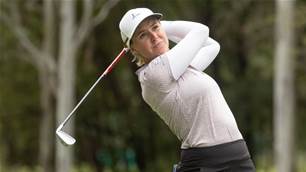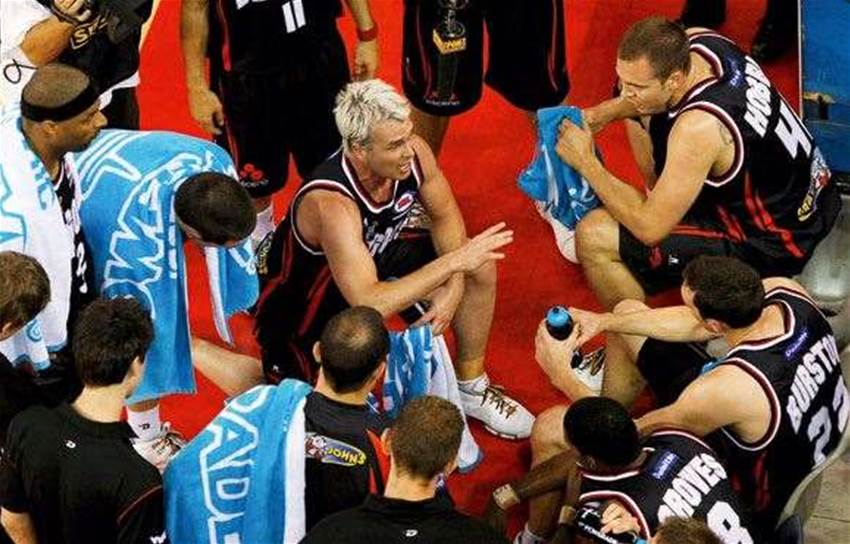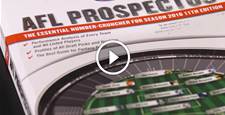Gentlemen prefer blondes, not blonds, especially not forms of the latter who are opposing point guards with lethal long-range shooting games and a bit of ’tude – like Shane Heal.
Gentlemen prefer blondes, not blonds, especially not forms of the latter who are opposing point guards with lethal long-range shooting games and a bit of ’tude – like Shane Heal.
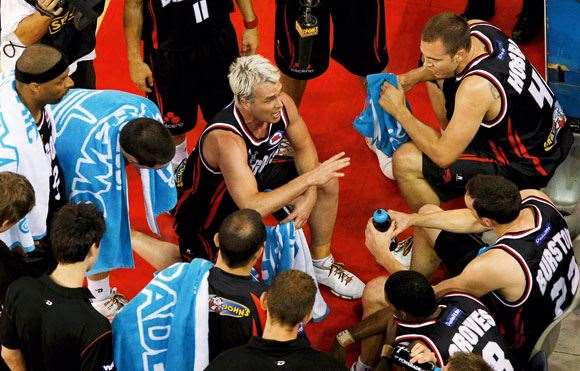 “The Dream Team tried to bully us but we stood up for ourselves."
“The Dream Team tried to bully us but we stood up for ourselves."Images: Getty Images
Dream Teamer Charles Barkley certainly found out about Heal’s mongrel. Sir Charles, of course, is made of stern stuff and lived to tell the tale, but didn’t exactly go back for much more after pushing, shoving and sharing verbal pleasantries with “Hammer” at the Atlanta Olympics in 1996. The 182cm “shorty’s” dogged determination saw him through the most ferocious of encounters, whether in his rookie-of-the-year NBL season for the Brisbane Bullets in 1988, for the Geelong Supercats (remember them?), the Sydney Kings, whom he captained to an NBL title in ’03, Greek pro outfit Makedonikos BC, the now-defunct South Dragons, Gold Coast Blaze, where he ended his playing days last summer, or even the Minnesota Timberwolves or San Antonio Spurs.
These days you can catch the still-cheeky Heal on Fox Sports as he crosses the country illustrating the science behind the on-court wizardry of the current crop of NBL troops as a commentator for the pay-TV broadcaster. He’s also assistant coach of our Olympic side, whom he represented between ’92 and ’04.Inside Sportgrabbed his thoughts on how the revamped eight-team NBL, damaged by, well, almost everything in recent times, is handling its status as bruised underdog on the Australian professional sporting landscape. Basketball could sure use a bit of Hammer’s mongrel to get itself out of this one
We all have our favourite NBL stars from its heyday – James “The Alabama Slammer” Crawford, “Mr Magic” Steve Carfino, “Leapin” Leroy Loggins ... Who was yours growing up?
Mine was Andrew Gaze – he’s five years my senior, dominated all the way through the junior ranks and went straight into the NBL. He did ultra well as an 18-year-old kid. For three of the four Olympics I played in, I ended up rooming with him. Now I commentate with him on Fox Sports! Obviously Andrew’s results in Australian basketball are Bradman-like – they’ll never be matched; statistically, anyway. He was certainly my idol in the NBL.
Where did you get your “Hammer” nickname from?
I got into a few scuffles when I was a bit younger and also enjoyed a bit of competitive boxing when I was growing up. I also played a lot of footy and, because of my attitude, I got into a bit of biff. All of a sudden they were calling me “Hammer” and it stuck.
What’s the vibe you get from players, fans and sponsors in your travels concerning the health and future of the NBL?
It’s no secret the NBL has fallen back a long way from its lofty days of the mid-90s. But I think people believe it’s hit the bottom and that there’s some positive signs the game is going to improve at the elite club level. It’s been tough with a few teams bowing out. I think it’s time the league got back to basics: enforce the salary cap, go out into the community – into the schools and the associations – and really try and create household names. All of which, thankfully, is starting to happen. The vibe will continue to improve and no doubt over the next five to ten years basketball will get back on the map.
So it’s very much a case of the children are our future, then?
I know back in the ‘80s and the early ‘90s school appearances by players were a really big part of all the clubs’ promotional activities. I think the league – the players and the clubs – stopped doing that for a certain period of time. I know myself when
star players visited our school we got to see the professionals up close and it was a fantastic opportunity. It only inspired you to go to a game or want to become like those players. I think that’s a really big part of getting the sport back to its glory days.
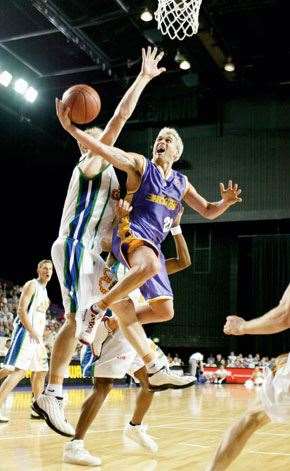 “I got into a few scuffles when I was a bit younger.”
“I got into a few scuffles when I was a bit younger.”Images: Getty Images
The back to basics approach of the NBL must be working … The crowd figures so far this season have been okay, haven’t they?
I think we’re lucky we have a lot of good basketball venues in places like Townsville, Cairns, the Gold Coast, Perth and Adelaide. The problems we had in the past, though, came from the Sydneys and the second venue in Melbourne where we had to play out of 10,000-seat stadiums, which meant we were living outside the sport’s means – we haven’t been able to get those sorts of crowds for a while. Getting back to basics and having 3000-to-5000-seat stadiums and putting a premium on those tickets – where it’s affordable for everybody, but everyone has to get in quick and you’re playing in front of sold-out crowds - is the best way to build excitement again.
So the league suffered from its own success in as far as its clubs having to pay higher running costs for bigger venues, etc?
Sometimes, if you’re not controlling all of your costs, what ends up happening is everyone gets competitive, trying to win the championship, obviously. But the salary cap wasn’t enforced over the last period of time. Then you get a business man like Brisbane Bullets owner Eddy Groves coming in, who wants to spend a fortune, and that makes it harder for other teams to compete, so they have to spend a lot more and all of a sudden we have some of the best teams who’ve enjoyed success actually being lost to the game. Being able to control those costs, like in any business, is a too-vital element of the game, as is making sure it’s policed and that everyone is of the same mindset. Then it becomes more equal across the league and more interesting for everybody.
When do you consider was the peak period for the NBL?
Probably the mid-90s – the game gained so much momentum. The NBA was enjoying enormous popularity out here as well. Merchandise sales were huge; everyone was in Jordan singlets and all the rest of it. We really rode that wave for a long time. Then things changed a little bit; it wasn’t as cool to be wearing NBA stuff as it used to be. The NBL lost free-to-air TV coverage, which everyone was watching on a Friday and Saturday night. It was fantastic to be on free-to-air because everyone had access to it and the players became household names. When people get attached to certain players, they’ll watch more basketball, or they’ll want to go to games.
That interest crisis hit one of your old clubs, the Sydney Kings, ultra hard. How does a three-peat title-winner come so unstuck?
For a long time people said, “There’ll never be success in Sydney, they’ll never win a championship,” and when we did everyone said, “The sport will just take off.” I think that process just wasn’t managed properly at the time through the ownership structures and people going out of business and everything else. The crowds actually dwindled with the more on-court success that came. I captained the Kings in our first championship in ‘02-03 and we had 10,000 turning up. The next year our stadium was lucky to be half-full. It was a surprise, but not good for the league.
What the hell was the more wins/less spectator thing all about? Especially in Sydney – it loves a winner!
I don’t know. I didn’t expect it. Most team’s crowds are similar as far as when they enjoy success, the locals jump on the band wagon. So I would’ve expected a similar mindset from the Sydney-siders. But again, if you’re not getting out into the community and you’re not embracing people to be a part of it, it ends up the way it did and people just don’t go, no matter what success you have.I remember the work we did in the early days … I worked with the Brisbane Bullets in my first year as a 17-year-old. I played and I worked, visiting schools etc, and you could just see the benefits of being out there day in, day out. You take a couple of hundred posters, sign one for every kid, do all the stuff you have to do and the benefits are enjoyed by everybody. Those days are well and truly gone, but I believe trying to get back into that mindset has been a focus of the league’s. I’m not speaking on behalf of the league, because I don’t know everything the league is doing. This is all just my perspective of what needs to happen.
 The Aussie in Wolves’ clothing. “You wanna piece?
The Aussie in Wolves’ clothing. “You wanna piece?Images: Getty Images
Were you mad taking on the captain/coach role of South Dragons in ’06? It’s hard enough holding down either job in modern pro sport on its own ...
There’s two tales to it. I came in after the team lost its first six games. Then we went on and we had an unbelievable season. It wasn’t really that difficult to be able to juggle the roles at all. We were the highest-finishing first-year franchise in history. It was great. The flipside to that was the second year: we loaded up with the youngest team in the league and we didn’t have the same success and we finished bottom and I departed from the club. They bought in Brian Goorjian and ended up spending double the budget the following year, buying all the players who had left the Kings and they had success. I really enjoyed the experience. If I did it again, I’d certainly do it differently, but it was a fantastic first year and I was happy to be a part of it.
If the league was to choose a pin-up glamour boy to hang its promo hopes on, who would you pick of the current crop as far as appeal and general basketball flair is concerned?
That’s a very good question. At the moment we have four Aussie guys playing in the NBA and half-a-dozen guys playing in Europe, which means our best ten players are all playing overseas. There are a number of Australian-based players, though, who they could look at like James Harvey at the Gold Coast, Mark Worthington in Melbourne for the Tigers. Guys like Patty Mills, who’s now in the NBA, is only 21, an indigenous kid, who’s a great talent and a really good personality, Andrew Bogut, the Matthew Nielsens and the David Andersens are all playing overseas. We have a lot of talent, we just have to be able to find ways to use their profiles to help the sport locally.
About that famous confrontation with Sir Charles at the Atlanta Games … What do you remember most about it?
I idolised him. He was awesome. He turned out to be a good bloke. They were pretty arrogant, though, and didn’t have a lot of respect for us. We were looking forward to playing against them but at the same time we said we weren’t going to take a backward step. The Dream Team disrespected us and tried to bully us a bit and we stood up for ourselves and it got a bit heated. It was a lot of fun. I reckon someone would ask me about that every second day. It amazes me – it happened in 1996 – that people still want to know about it.
Your tip for the 2009/2010 NBL champs?
I’m ashamed to say it, but I think the Kiwis – the New Zealand Breakers. I have a pain in my gut as I’m saying it. They have a great line-up and they’re well coached.
– James Smith
Related Articles
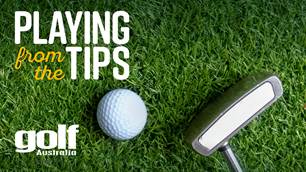
Playing From The Tips Ep.100: Webex Sydney, Honda LPGA, Mexico & Kenyan Opens
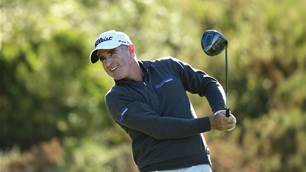
Video interview: Drinks With ... Matt Millar
